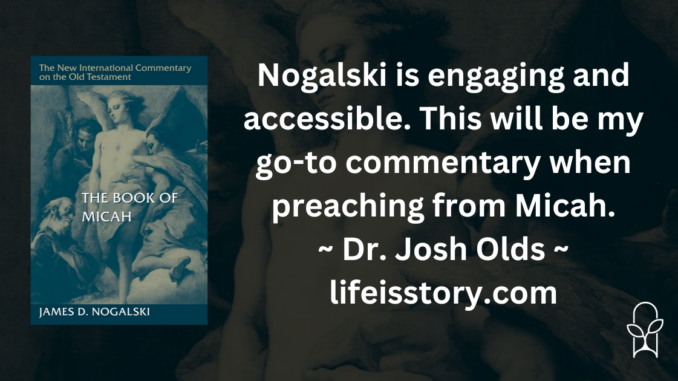
Also by this author: The Books of Joel, Obadiah, and Jonah
Series: New International Commentary on the Old Testament
Published by Eerdmans on April 18, 2024
Genres: Academic
Buy on Amazon
Goodreads

What is the balance between judgment and hope?
Micah spoke powerfully to the people of Judah millennia ago. His prophecy has the same power to change the minds and hearts of Christians today. As a volume of the New International Commentary on the Old Testament, James D. Nogalski’s fresh commentary on Micah is academically serious and pastorally relevant.
Based on Nogalski’s original translation of the Hebrew text, this commentary takes seriously the historical and theological contexts of the book of Micah. The thorough introduction considers the book’s literary form, its composition, and its function in the canon, especially within the Book of the Twelve. Ample notes point readers to the most relevant, up-to-date critical scholarship. Nogalski explicates Micah’s major themes, including fidelity to Yahweh, abuses of power, and the intriguing juxtaposition of judgment and hope for God’s people.
Combining scholarly rigor with an evangelical point of view, The Book of Micah serves as the perfect companion for scholars, students, and pastors seeking to understand this essential prophet.
New International Commentaries are the one commentary set of which I own every volume and it has become my constant companion in biblical exegesis and sermon preparation. Even when I don’t agree with the conclusions, I’ve found the NICOT and NICNT series to reflect the very best in contemporary scholarship—both engaging in and enlightening, deftly balancing between a commentary meant for laypersons and a commentary meant for academics. The result is a versatile series that is beneficial for biblical scholars, but especially helpful to clergy.
About seven months ago, I wrote a review of James Nogalski’s The Books of Joel, Obadiah, and Jonah. I noted then that particular volume was replacing Leslie Allen’s 1976 volume covering the same books plus Micah. Did that mean Micah was getting his own standalone treatment? I can tell you now that the answer is yes, and that treatment is also done by Dr. Nogalski.
Allen’s 1976 volume was basically a commentary on Micah with comments on the other books appended to it. Nogalski’s update was more comprehensive and thorough—especially as the past fifty years have changed a lot of academic thinking on those books—but it apparently left no room for Micah. Now The Book of Micah gets his own volume.
Weighing in at just over 250 pages, Eerdmans probably could have fit this into the combined volume if they were forced to. It would have meant a 700+ page volume, on par with some of their larger commentaries—though those only cover one book. However, for accessibility and practicability, a standalone volume makes the most sense.
It also makes sense that Nogalski was tapped to write the volume—indeed, I wonder if the original assignment wasn’t to replace Leslie’s volume and as the pages rolled in, it soon became clear that two volumes were needed. Nogalski is an expert on the Book of the Twelve. He’s written several commentaries on the Book of the Twelve as a whole and coauthored a book with Ehud Ben Zvi—founder of the Journal of Hebrew Scriptures—concerning differences between Jewish and Christian interpretation of the Book of the Twelve. Something that can be problematic about Christian commentaries on the Old Testament is that they don’t have a full grasp of what that text meant to its original Jewish audience. Nogalski does and that respect for the text and respect for Judaism shows through his work.
For example, Micah 5:1-3 is often used as a Messianic text. It contains the famous prophecy about Messiah being born in Bethlehem: “But you, Bethlehem Ephrathah, though you are small among the clans of Judah, out of you will come for me one who will be ruler over Israel…” The Christian interpretation is easy—it’s Jesus! But Nogalski interprets it more generally, saying that the text’s original intent is just to say that a descendent of David will save Jerusalem from a siege and restore the exiles. Nogalski even muses that this prophecy might have originally referred to Zerubbabel, who rebuilt the Temple in the days of Haggai and Zechariah.
The Book of Micah is written like a direct sequel to the previous volume, meaning that while in Joel, Obadiah, and Jonah, Nogalski spends time discussing the Book of the Twelve as a whole, he does not rehash that information here, only offering an eleven-page section that contextualizes Micah within the rest of the so-called “minor” prophets.
The Book of Micah spends about the first 20 percent of its bulk on the introduction. Nogalski sets the historical background, traces its composition through the centuries, and offers thoughts on how to read and think about the prophetic text today. Nogalski’s commitment to contemporary application is particularly important for these texts which are all to often ignored within church life today. Nogalski writes about how Micah was keen to speak truth to power in substantive ways: “Christian churches today and their members need to hear the words of Micah as though they were directed to them.” So even though this is an ancient text and Nogalski treats it as such, he is also away of its contemporary prophetic power.
The Book of Micah is a wonderful update to Leslie Allen’s earlier volume. Nogalski is engaging, comprehensive, and able to remain both scholarly and accessible. Like most other commentaries in this series, it’ll be my first go-to when preaching from this book.
